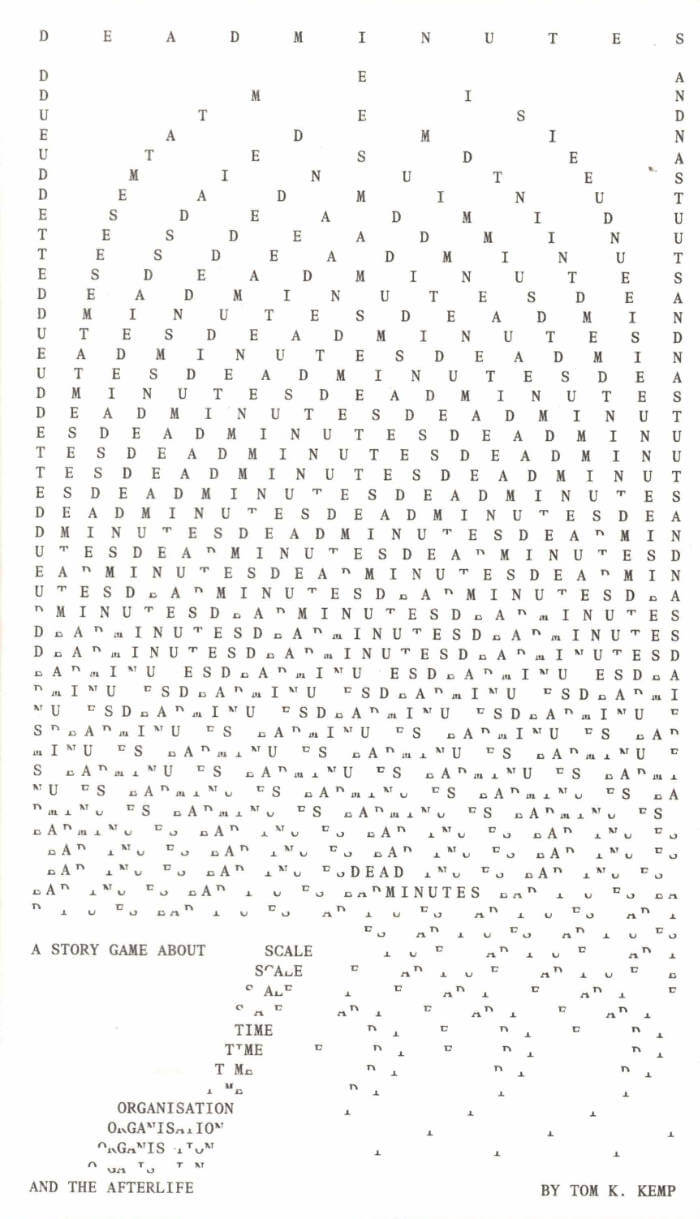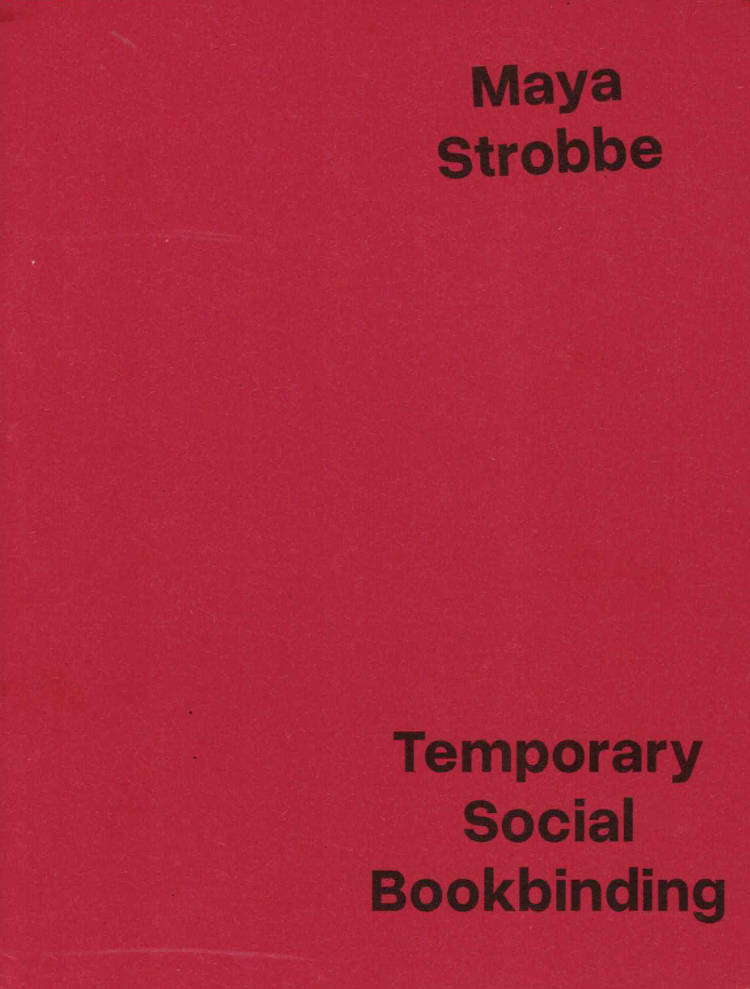
Fanta For The Ghosts
fanta for the ghosts by Elisabeth Molin
120mm x 210mm
edition of 500
Co-published with OneThousandBooks and Elisabeth Molin

fanta for the ghosts by Elisabeth Molin
120mm x 210mm
edition of 500
Co-published with OneThousandBooks and Elisabeth Molin

Dead Minutes is a storytelling game about systemic change in an undesirable afterlife. You, the players, will decide what this hell, underworld or land of the dead is like, what its problems are, how change happens there, and what the complications might be when altering something so big, involving so many dead people, over so much time. It’s a game about impossible seeming actions at impossible seeming scales, making difficult choices, and dealing with unexpected outcomes.
The first half of this book gives you everything you need to play a session of Dead Minutes, which takes 2-5 hours with 3-6 people.
The second half features an essay by Patricia Reed that expands on the concepts of heuristic fictions and vital zombies in relation to the afterlife, and a series of afterlife generating 'seeds' contributed by different types of writers - a demonic boardroom presentation by writer and art critic Habib William Kherbek, a ritual from horror game designer Samuel Clarice Mui Shen Ern, a premise by Arthur C Clarke award winning author Chris Beckett, and a letter from Selma Selman.

Ladies wear the blue is a collection of watercolour drawings by the hand of Melissa Mabesoone and Oshin Albrecht. The blue watercolours portray women from different moments in time. The adjacent texts describe these women's existence, roles, desires or ideosyncrasies deriving from the 'blue' in their lives. From the first female police officers and Alices all around, to Courtney Love's blue baby dolls and the girl with the blue tattoo Olive Oatman, this publication is an ode to women venturing into the world, and a way to continue telling their herstories.

This bootleg edition collects scanned copies of Monique Wittig's writing. It includes; The Lesbian Body, Les Guérillères, The Opoponax, and Lesbian Peoples: material for a dictionary— In true bootleg style, punk enough to carry the truly radical words of Wittig: scans, a little grainy, with marginalia of unknown origins. Now, we can dress ourselves in the ravishingly erotic, violent splendorous brilliance to become baby Wittigs.
This edition was assembled out of a deep love of Wittig's work by Chloe Chignell.
Monique Wittig was a French author and feminist theorist particularly interested in overcoming gender and the heterosexual contract. She published her first novel, L'opoponax, in 1964. Her second novel, Les Guérillères (1969), was a landmark in lesbian feminism.


Produced in conjunction with the exhibition that took place at Maison Pelgrims (10/9-23/10/2021), the book presents original interventions by the artists of the rosa rosae rosae project : Alicia Jeannin, Alicja Melzacka, Angela Detanico & Rafael Lain, Annaïk Lou Pitteloud, Audrey Cottin, buren, Charlie Usher, Eleanor Ivory Weber, Eva Giolo, Henry Andersen, Jan Vercruysse, Maíra Dietrich, Marc Buchy, Maxime Jean-Baptiste, Niels Poiz, Oriol Vilanova, Sabir (Lucie Guien, Amélie Derlon Cordina, Sophie Sénécaut / Perrine Estienne, Kevin Senant, Maud Marique, Pauline Allié, Carole Louis), Slow Reading Club, Sofia Caesar, Surya Ibrahim, Yiannis Papadopoulos, Yoann Van Parys
Edited by Pauline Hatzigeorgiou / SB34
Graphic design by Tipode Office
The book was produced with the support of Fédération Wallonie-Bruxelles (aide à l'édition) and Région Bruxelles-Capitale (Image de Bruxelles)

published commonly, no no no expounds an experimental poetic offering, both text & art.
each issue features a limited edition artwork. which can be tacked or framed or stored in a drawer.
celestial in nature, no no no takes the form required, and necessary.

A zine exploring the body as a bookbinding tool.
Concept and graphic design: Maya Strobbe
Models: Celine Aernoudt and Maya Strobbe
Photographer: Julia Cesnulaityté
Editorial feedback: Linus Bonduelle
Set in Overused Grotesk
First edition of 250 copies
Brussels

Mars Dietz, Opashona Ghosh and 1 more
HONEY is a zine meditating on the experiences of friendship.
Volume 2 was edited by Mars Dietz, Opashona Ghosh and Dylan Spencer-Davidson—each inviting contributions from friends.
Following vol. 1’s optimism about the underappreciated potentials of friendship, vol. 2 marks a noticeable turn towards friendship's messier sides. Letters to deceased friends, childhood social complexities, unrealised sexual desire, pushback against the overfetishisation of queer kinship, and more.
Contributions from Azul De Monte, Ana Božičević, D Mortimer, Adriana Disman, Pelumi Adejumo, Iggy Robinson, Clay AD, To Doan, Edward Herring, marum, Lou Drago, Aisha Mirza, Iga Świeściak, Roya Amirsoleymani, George Lynch, Emily Pope and Kari Rosenfeld.
Original artworks by Opashona Ghosh and Iga Świeściak, and featuring artworks by Azul De Monte and Emily Pope.
Riso printed on recycled paper with Pagemasters (London).